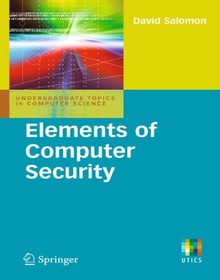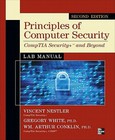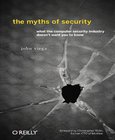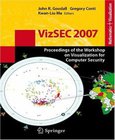Elements of Computer Security

Book Details:
| Publisher: | Springer |
| Series: | Springer |
| Author: | D. Salomon |
| Edition: | 1 |
| ISBN-10: | 0857290053 |
| ISBN-13: | 9780857290052 |
| Pages: | 395 |
| Published: | Aug 13 2010 |
| Posted: | Nov 19 2014 |
| Language: | English |
| Book format: | |
| Book size: | 5.13 MB |
Book Description:
As our society grows ever more reliant on computers, so it also becomes more vulnerable to computer crime. Cyber attacks have been plaguing computer users since the 1980s, and computer security experts are predicting that smart telephones and other mobile devices will also become the targets of cyber security threats in the future. Developed from the author's successful Springer guide to Foundations of Computer Security, this accessible textbook/reference is fully updated and enhanced with resources for students and tutors. Topics and features: examines the physical security of computer hardware, networks, and digital data; introduces the different forms of rogue software (or malware), discusses methods for preventing and defending against malware, and describes a selection of viruses, worms and Trojans in detail; investigates the important threats to network security, and explores the subjects of authentication, spyware, and identity theft; discusses issues of privacy and trust in the online world, including children's privacy and safety; includes appendices which discuss the definition, meaning, and history of the term hacker, introduce the language of "l33t Speak", and provide a detailed virus timeline; provides numerous exercises and examples throughout the text, in addition to a Glossary of terms used in the book; supplies additional resources at the associated website, http://www.DavidSalomon.name/, including an introduction to cryptography, and answers to the exercises. Clearly and engagingly written, this concise textbook is an ideal resource for undergraduate classes on computer security. The book is mostly non-mathematical, and is suitable for anyone familiar with the basic concepts of computers and computations.
Download Link:
Related Books:
Principles of Computer Security
CompTIA Security+ and Beyond Lab Manual
2nd Edition
Written by leading IT security educators, this fully updated Lab Manual supplements Principles of Computer Security: CompTIA Security+ and Beyond, Second Edition Principles of Computer Security Lab Manual, Second Edition, contains more than 30 labs that challenge you to solve real-world problems with key concepts. Clear, measurable lab objectives map to CompTIA Security+ certification exam objectives, ensuring clear correspondence to Principles of Computer Security: CompTIA Security+ and Beyond, Second Edition. The Lab Manual also includes materials lists and lab set-up instructions. Step-by-step, not click-by click, lab scenarios require you to think ...
The Myths of Security
What the Computer Security Industry Doesn't Want You to Know
If you think computer security has improved in recent years, The Myths of Security will shake you out of your complacency. Longtime security professional John Viega, formerly Chief Security Architect at McAfee, reports on the sorry state of the industry, and offers concrete suggestions for professionals and individuals confronting the issue. Why is security so bad? With many more people online than just a few years ago, there are more attackers -- and they're truly motivated. Attacks are sophisticated, subtle, and harder to detect than ever. But, as Viega notes, few people take the time to understand the situation and protect themselves accordingly. This book tells you:Why it's easier for bad guys to "own" your computer than you think Why a...
VizSEC 2007
Proceedings of the Workshop on Visualization for Computer Security
Networked computers are ubiquitous, and are subject to attack, misuse, and abuse. One method to counteracting this cyber threat is to provide security analysts with better tools to discover patterns, detect anomalies, identify correlations, and communicate their findings. Visualization for computer security (VizSec) researchers and developers are doing just that. VizSec is about putting robust information visualization tools into the hands of human analysts to take advantage of the power of the human perceptual and cognitive processes in solving computer security problems. This volume collects the papers presented at the 4th International Workshop on Computer Security - VizSec 2007....
2007 - 2021 © eBooks-IT.org



